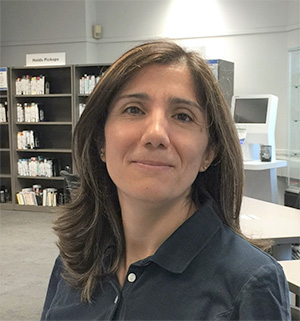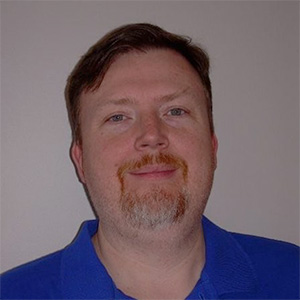This issue of the CAFE Monthly is focused on celebrating our DC faculty’s creative teaching approaches. We hope you are as inspired as we are by your colleagues’ focus and dedication in the classroom, lab, field and community. This issue ends our first academic year in this format. For those of you who are going on vacation, we wish you a very wonderful break and hope you get a chance to enjoy the season!
|

Ruba Alomari, a faculty member in Durham College’s (DC) School of Business, IT & Management, began her IT career as a system engineer responsible for maintaining a small network and worked in a number of positions over a 15-year period, including a network manager. She received her Master’s degree in Information Security, and a Ph.D. in Computer Science and was the recipient of the Doctoral Excellence Award. Dr. Alomari teaches information security in the Cybersecurity graduate certificate, and operating systems in the Computer Systems diploma.
Dr. Alomari finds joy and satisfaction in teaching her students, encouraging them to take an active role in their learning, and to be accountable for their work, as this helps them prepare for the industry.
She says, "Professors and students share equal challenges and responsibilities in the education process. We both value and enjoy knowledge together, and the success of one is the success of the other and the same applies to failure."
To ensure that her students have an avenue to provide continuous feedback, Dr. Alomari provides an anonymous feedback form to the class to allow the students to give feedback at any time during the semester. When planning her lesson, she uses the 'Jumpstart Model': Connect, Learn, Practice, and Synthesis. This aligns with what college education is all about for her: applied learning at its finest beginning with an interactive communication experience, presenting new content, offering hands-on learning and summarizing the learning.
|
|
Creating a National Community of Practice – Edward Logan
|

Edward Logan is a full-time professor teaching in the Mechanical Techniques- Plumbing Program and Plumbing Apprenticeship Program. He integrates theoretical information and hands-on experience in his residential and commercial plumbing fundamental courses, and embeds creative and innovative practices in his teaching. He has also pulled together plumbing faculty from across the country to share practices. He has worked a large part of his plumbing career in the ICI (industrial, commercial, and institutional) sector.
Mr. Logan says, "To be able to watch my students evolve is the aspect that motivates me to teach. I am even more motivated when they come back to visit after graduation and tell me about their success and thank me for helping them."
One of his long-term goals is to establish a Plumbing Instructors / Professors community. Recently, he held a session for plumbing professionals and had 18 professors online from British Columbia, Alberta, Ontario and the United States. The discussion focused around what lessons were learned going remote and which new tools / resources have been discovered to help faculty teach remotely.
"Everyone enjoyed the discussion and is eager to continue it. We hope to increase the number of participants for our next session. My hope is that our group will join with the electrical group and other skilled trade professors in creating an annual community of practice sessions for skilled trade professors." says Mr. Logan.
Getting himself and his students up to speed up for virtual sessions on Microsoft Teams had its own challenges. He puts his students’ success first and is empathetic in his teaching style which includes a universal design for learning approach that enables them to be successful.
Mr. Logan says, "It is a style that is capable of adapting to the needs of students."
|
|
Establishing a Community of Care
|
The School of Health and Community Services (HCS) faculty showed their commitment in helping students and staff tackle remote learning by creating a Community of Care consisting of their staff and students. The HCS faculty worked collaboratively to provide support for their students and staff in need through open communication, emotional support, as well as IT support throughout the past three months. With the need to move to remote learning, revisions have been made to courses including virtual delivery plans and revised learning activities and problem-solving opportunities.
We asked three faculty members in HCS, Deborah Schuh, Debra Morrison and Kimberlee Neault, to share insights on the challenges, developments and simulations faced during the transition period.
|
|
The Cohort Experience: General Education Faculty Reflect on Teaching Squares
By Mike Evans, Jordanne Christie, Clayton Rhodes, Robert Savelle, and Nathan Wilson
|
Recently, we General Education professors participated in the CAFE facilitated Teaching Squares. Typically, faculty from different program areas make up a teaching square; they take turns visiting one another’s classes over a short period. As Neil Haave (2018) explains, having instructors from different programs is key to the square’s success. "The views and perspective of those who teach different kinds of content can be very helpful in providing new perspectives on the content being taught," he writes. However, we wondered what could be gained by tackling Teaching Squares as a General Education cohort. The significant thematic variability within the General Education curriculum coupled with contrasting teaching styles satisfies Haave's point about observing those who teach dissimilar content with different deliveries. The fact, though, that we approach our respective topics within a larger General Education framework led us to ask questions that would best be answered in a square. For example, "given that General Education classes are made up students from various disciplines at various points in their programs of study, how can I ensure the material speaks to each learner?"" Additionally, "how do I ensure that my course reflects the spirit of the broader General Education mandate?"" Moreover, "does that particular activity or teaching method that works well in one General Education course mean it will work well in mine?"
As General Education faculty, we develop and deliver our courses (on behalf of all Schools and programs) with certain requirements in mind regardless of our subject. First, General Education is interdisciplinary; topics, practices, and knowledge are outside a student’s chief area of focus and the students themselves are from various programs. Second, General Education does not teach technical skills, but rather the more abstract traits of recognizing social complexities, appreciating the many ways to make meaning in this world, and navigating the intricacies of interpersonal interactions. Third, General Education cultivates cognition by strengthening a learner’s broader critical and creative thinking competences as well as their problem solving and decision-making capabilities. Therefore, General Education in concert with a student’s main program of study, better positions graduates to contribute positively to their communities and workplaces -- students have received education in both the hard and soft skills needed to be successful in today’s world.
Although our experience was cut short by the sudden transition to remote learning, the five of us did have enough occasion to gather ideas on how our teaching approaches differ and yet support the reason-for-being of General Education. We share the following with the hope that you find some applicability to your own practice while also considering the value that comes from forming a future Square with your School or program colleagues.
|
Make sure to check out our webpage in the coming week as we will continue to update you with new weekly PD sessions. The schedule will be refreshed every Friday for the following week!
|
|
|
|
|